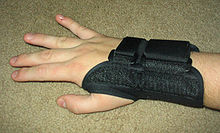
Back اضطرابات عضلية هيكلية Arabic Enfermedades musculoesqueléticas Spanish Lokomozio-aparatuaren gaixotasun Basque Tuki- ja liikuntaelinsairaudet Finnish Trouble musculosquelettique French 근골격계 장애 Korean Bóle mięśniowo-szkieletowe Polish Захворювання опорно-рухового апарату Ukrainian
| Musculoskeletal disorders | |
|---|---|
 | |
| Carpal tunnel syndrome is a common musculoskeletal disorder, and is often treated with a splint. | |
| Specialty | Rheumatology |
Musculoskeletal disorders (MSDs) are injuries or pain in the human musculoskeletal system, including the joints, ligaments, muscles, nerves, tendons, and structures that support limbs, neck and back.[1] MSDs can arise from a sudden exertion (e.g., lifting a heavy object),[2] or they can arise from making the same motions repeatedly (repetitive strain), or from repeated exposure to force, vibration, or awkward posture.[3] Injuries and pain in the musculoskeletal system caused by acute traumatic events like a car accident or fall are not considered musculoskeletal disorders.[4] MSDs can affect many different parts of the body including upper and lower back, neck, shoulders and extremities (arms, legs, feet, and hands).[5] Examples of MSDs include carpal tunnel syndrome, epicondylitis, tendinitis, back pain, tension neck syndrome, and hand-arm vibration syndrome.[3]
- ^ "CDC - NIOSH Program Portfolio : Musculoskeletal Disorders : Program Description". www.cdc.gov. Retrieved 2016-03-24.
- ^ Kumaraveloo, K Sakthiaseelan; Lunner Kolstrup, Christina (3 July 2018). "Agriculture and musculoskeletal disorders in low- and middle-income countries". Journal of Agromedicine. 23 (3): 227–248. doi:10.1080/1059924X.2018.1458671. PMID 30047854. S2CID 51719997.
- ^ a b "CDC - NIOSH Publications and Products - Musculoskeletal Disorders and Workplace Factors (97-141)". www.cdc.gov. 1997. doi:10.26616/NIOSHPUB97141. hdl:2027/coo.31924078629387. Retrieved 2016-03-24.
- ^ Prevention, Centers for Disease Control and. "CDC - Workplace Health - Implementation - Work-Related Musculoskeletal Disorders (WMSD) Prevention". www.cdc.gov. Retrieved 2016-03-24.
- ^ Kuorinka, I.; Jonsson, B.; Kilbom, A.; Vinterberg, H.; Biering-Sørensen, F.; Andersson, G.; Jørgensen, K. (1987). "Standardised Nordic questionnaires for the analysis of musculoskeletal symptoms". Applied Ergonomics. 18 (3): 233–7. doi:10.1016/0003-6870(87)90010-x. PMID 15676628.
© MMXXIII Rich X Search. We shall prevail. All rights reserved. Rich X Search